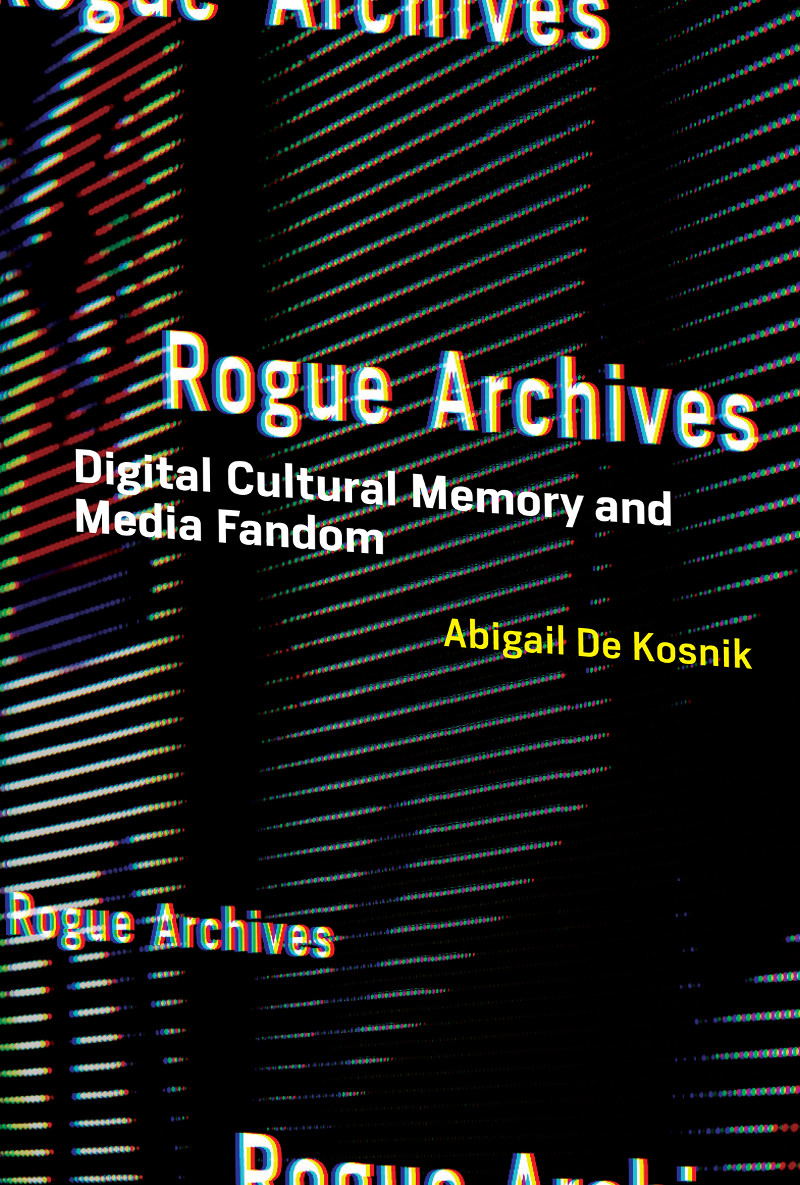Abigail De Kosnik: Rogue Archives: Digital Cultural Memory and Media Fandom (2016)
Filed under book | Tags: · archive, archiving, cultural memory, digital media, diy, fan culture, fiction, internet, preservation

“The task of archiving was once entrusted only to museums, libraries, and other institutions that acted as repositories of culture in material form. But with the rise of digital networked media, a multitude of self-designated archivists—fans, pirates, hackers—have become practitioners of cultural preservation on the Internet. These nonprofessional archivists have democratized cultural memory, building freely accessible online archives of whatever content they consider suitable for digital preservation. In Rogue Archives, Abigail De Kosnik examines the practice of archiving in the transition from print to digital media, looking in particular at Internet fan fiction archives.
De Kosnik explains that media users today regard all of mass culture as an archive, from which they can redeploy content for their own creations. Hence, “remix culture” and fan fiction are core genres of digital cultural production. De Kosnik explores, among other things, the anticanonical archiving styles of Internet preservationists; the volunteer labor of online archiving; how fan archives serve women and queer users as cultural resources; archivists’ efforts to attract racially and sexually diverse content; and how digital archives adhere to the logics of performance more than the logics of print. She also considers the similarities and differences among free culture, free software, and fan communities, and uses digital humanities tools to quantify and visualize the size, user base, and rate of growth of several online fan archives.”
Publisher MIT Press, 2016
ISBN 9780262034661, 0262034662
x+430 pages
Reviews: Jan Baetens (Leonardo, 2017), Amanda Gilroy (PopMatters, 2017), Ludi Price (2016), Silvia Bertolotti (DigiCult, 2016).
Interview with author: Henry Jenkins (2016), Christina Yang (TDR, 2019).
HTML (added on 2020-3-13)
PDF (10 MB, updated on 2020-3-12)
Academia.edu (added on 2020-3-13)
Baylee Brits, Prudence Gibson, Amy Ireland (eds.): Aesthetics After Finitude (2016)
Filed under book | Tags: · aesthetics, anthropocene, fiction, human, immanence, noise, philosophy, sound, subject, theory

“Traditionally aesthetics has been associated with phenomenal experience, human apprehension and an appreciation of beauty—the domains in which human cognition is rendered finite. What is an aesthetics that might occur ‘after finitude’?”
Contributions by Marc Couroux, Prudence Gibson, Thomas Sutherland, Lendl Barcelos, Douglas Kahn, Adam Hulbert, Baylee Brits, Stephen Muecke, Laura Lotti, Christian R. Gelder, Simon O’Sullivan, Tessa Laird, Chris Shambaugh (and Maudlin Cortex), Chaim Horowitz, and Amy Ireland.
Afterword by Justin Clemens
Publisher re.press, Melbourne, Dec 2016
Anamnesis series
Creative Commons BY-NC-ND License 2.5
ISBN 9780980819793, 0980819792
241 pages
Conference (2015)
Publisher
WorldCat
Collected Works of Velimir Khlebnikov, 3 vols. (1987-1998)
Filed under poetry | Tags: · fiction, futurism, language, literary theory, literature, poetics, poetry, theatre, zaum



“Dubbed by his fellow Futurists the “King of Time”, Velimir Khlebnikov (1885–1922) spent his entire brief life searching for a new poetic language to express his convictions about the rhythm of history, the correspondence between human behavior and the “language of the stars.” The result was a vast body of poetry and prose that has been called hermetic, incomprehensible, even deranged. Of all this tragic generation of Russian poets (including Blok, Esenin, and Mayakovsky), Khlebnikov has been perhaps the most praised and the more censured.”
Edited by Charlotte Douglas (1), Ronald Vroon (2-3)
Translated by Paul Schmidt
Publisher Harvard University Press, 1987-98
ISBN 0674140451 (1), 067414046X (2), 0674140478 (3)
xii+452 & xii+403 & x+274 pages
Reviews: Cooke (of Vol 1, SEER 1989), Yastremski (of Vol 2, SEEJ 1990).
1. Letters and Theoretical Writings (1987, 29 MB)
2. Prose, Plays, and Supersagas (1989, 17 MB)
3: Selected Poems (1998, 10 MB)
More from Khlebnikov (incl 6-volume Russian collection)
Khlebnikov on Ubuweb Sound

